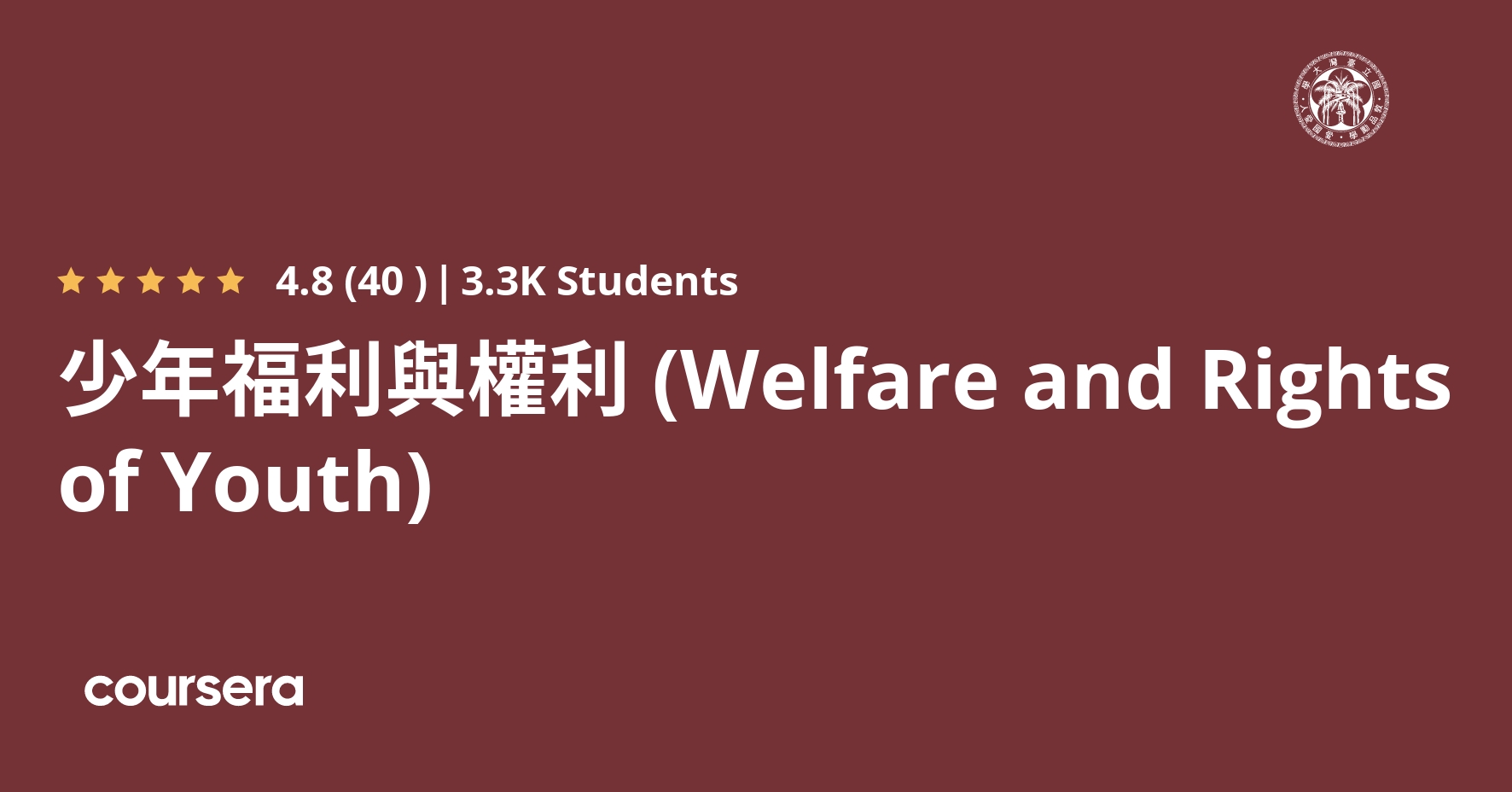Description
課程介紹
世上有許多事可以等待
但孩子是不能等的
他的骨在長,他的血在生
他的意識在形成
我們對他的一切不能答以「明天」
他的名字是「今天」 -智利詩人Gabriela Mistral
少年是我們國家未來的「希望」,如何提供他們一個健全發展的環境是各國致力的目標。本課程旨在探討當今少年的基本福利與權利,以及其所面臨的各種問題與挑戰,並討論影響少年問題產生之相關因素,以及社會工作領域在處理少年問題時所採用的對策。此外,也將探討相關少年福利政策的意義與對社工實務的影響,並將強調以社會工作的觀點來深入討論上述各項與少年有關的議題或問題、影響問題形成的因素以及預防和輔導少年問題相關對策。 (課程涵蓋國內外相關論述)
因響應聯合國人權倡議課程計畫,特別將此門課的影片字幕更新為有英文字幕可以供學習者選擇,歡迎外國朋友一同來學習,不過英文學習部分,目前現階段計畫僅影片有英文字幕,其他學習資源、素材的語言更新,有待後續完整化。
另外在作業方面也新增了相關方案執行的範例提供大家參閱,也鼓勵同學在學習之餘,除了有擬定計畫的能力之外,也可以嘗試執行,進而對此領域有不同貢獻。
本課程之課程目標:
1) 對於少年之福利、權利議題有正確的認識。
2) 建立對少年族群正確的觀念,破除相關迷思與刻板印象。
3) 具備社會工作基礎專業知識來同理並協助處遇少年福利相關議題。
4) 能夠發揮社會正義的精神來倡導少年權利維護之相關議題。
本課程之授課形式:
本堂課將以演講影片為主,其中也包含實務工作者經驗分享與個案分析等,並穿插選擇題項的問題討論,帶動同學能將課堂知識與生活經驗連結、反思。此外,同學也必須完成線上討論與作業繳交,以及至少需觀看其他兩位同學的作業並給予評論。
本課程之修課背景要求:
修習本課程的同學,不需專業基礎,只要具備基本中文、英文閱讀能力,並對少年福利、權利及社會工作方法有興趣即可。
About the course (Course Introduction)
“Many things we need can wait.
The child cannot.
Now is the time his bones are formed, his mind developed.
To him we cannot say tomorrow, his name is today.”
–Gabriela Mistral
Youth are “hope” of our country’s future, to provide them with a proper environment for development is a goal pursuited by every country out there. This course aims to explore the basics of youth welfare and right as well as the various problems and challenges to be overcome. We will also discusses factors that affect the emerging youth problems and how social workers deal with such situation.
In addition, we will also explore the significance of youth welfare policy and its impact on the social work practices. We’ll expand upon and discuss factors that affect the problems as well as prevention and consultation from social work perspective. The course will cover perspective from around the world.
In response to the SDG (Sustainable development goals) initiative project, this course is updated with English subtitle. Foreign students are welcomed to join us. However, the course now only features partial translation. Various resources will be updated with English translation in the future. Moreover, we’ve also added examples of program implementation to our homework. Students are encouraged to participate in related projects extend learning beyond the scope of this course.
The objectives of the course are:
1) To have proper understanding of obstacles faced when implementing youth welfare and rights.
2) To establish the correct concept of youth group, and dispel related myths and stereotypes.
3) To have the basic knowledge of social work to empathize and assist in dealing with issues related to the welfare of youth.
4) To motivate students in protecting youth rights.
Course format
This course is consisted of lecture videos, featuring practitioners experience sharing, case analysis, mid-course discussion. Linking students’ personal experience with knowledge provided in this course. In addition, students must also complete the online discussion and upload homework, and at least review and comment on two other students’ homework.
Recommended background
Students who study this course do not need to have a professional foundation as long as they have basic reading and writing skills and are interested in youth welfare, rights and social work methods.
What you will learn
少年福利與權利 (Welfare and Rights of Youth)
理解本課程要求與學習目標,以及瞭解「少年」及「福利」、「權利」概念的形成與意涵,並透過聯合國兒童權利公約的介紹,學習少年福利與權利 ( right ) 的實體內涵,與當前少年權利在華人世界所遇到的特殊挑戰。
少年的社會形象、次文化與問題需求(Social image, Subculture and Needs of Youth)
透析「可惡的少年」之社會形象的形成,並透過特殊的社會議題與案例探討,辨別凝視近年來少年所顯露之各項社會挑戰的不同視野─「危機(risk)」、「問題(problem)」,抑或是「需求(need)」。
以生態系統理論來討論少年問題(Use Ecological Systems Theory to Discuss Youth Problems)
從合併內外化問題的案例中,利用相關理論脈絡,以個人為核心,探討其與家庭、學校及社區(社會)互動之生態系統脈絡,並能提出相應問題的解決之道(相關服務策略)。
從消權到充權 (From Disempowerment to Empowerment)
理解「剝削」、「消權」與「充權」的概念。同時經由現今少年社會議題、案例與政策的討論,檢視個人與當今社會福利服務的價值偏向,並進行反思、建議。




